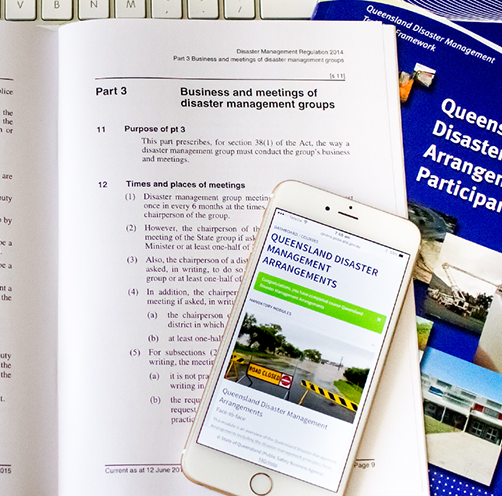Capability enhancement through disaster management training: the Queensland experience
Jane Zsombok, Queensland Fire and Emergency Services
Article
Disaster management education and training is an essential component of capability enhancement. It is one of the activities undertaken to maintain and enhance Queensland disaster management arrangements. The Queensland Disaster Management Act 2003 provides the legislative requirement for those involved in disaster operations to be appropriately trained. To support these requirements, training for Queensland disaster management stakeholders is undertaken in accordance with the Queensland Disaster Management Training Framework.
Queensland’s journey
A review of Queensland’s disaster management legislation and policy was undertaken in 2009 by Jim O’Sullivan and the Consultancy Bureau. The resulting report highlighted shortfalls in training and recommended an increase in competency levels for stakeholders involved in disaster management. While disaster management training was undertaken in Queensland prior to 2009, there was no approved, consistent curriculum nor learning pathways.
In response to the 2009 review, a framework for the delivery of disaster management training in Queensland was established. The Queensland Disaster Management Training Framework1 was developed in consultation with stakeholders and was implemented in 2011. The Framework and supporting curriculum were designed to build capability and capacity in skills, knowledge and development areas relevant to Queensland and, ultimately, to support participant effectiveness in their roles.
The Queensland Government response to the Queensland Floods Commission of Inquiry2 in 2011 provided additional focus on disaster management training. Priority was placed on training for stakeholders in key positions and to provide training online. During 2012-2013 the Regional College of Disaster Management (RCDM) project was developed and approved. The project provided an injection of additional vocational and higher education training in disaster management during 2014-2016. The project also delivered the Disaster Management Learning Management System. The system launched in March 2015 provides online courses and access to training records. The system’s learning pathways are customised to reflect the Framework and Queensland’s disaster management roles.
Queensland training framework
The Framework covers a range of topics including disaster coordination centres, resupply, warnings, cyclone shelter management, evacuation, evacuation centre management, disaster relief and recovery funding, and recovery.
The majority of the training is undertaken face-to-face at stakeholder locations. This delivery model suits stakeholder requirements and, partnered with the online modules, provides accessible and structured training.
Framework trainers have relevant content knowledge and hold training and assessment qualifications. The Framework and supporting curriculum are continually evaluated and updated with policy amendments and lessons identified from operational reviews and exercises. Continual improvement provides quality assurance, credibility and consistency in the training.
An evaluation3 of Framework training showed an 87 per cent overall participant satisfaction rating. Importantly, 91 per cent of survey respondents indicated the training had improved their capability to perform their disaster management role.
Training in accordance with the Framework continues with 9471 units of training delivered across the 2015-16 financial year. Training provision through the Framework meets the legislative requirements for disaster management training in Queensland and will remain the primary focus of training provision.

Regional College of Disaster Management
The RCDM initiative was designed as a short-term addition to education and training in disaster management to complement the Queensland Disaster Management Training Framework. Specifically the RCDM project delivered the Advanced Diploma of Public Safety (Emergency Management) and the Graduate Certificate in Disaster Management.
Participants in the programs were drawn from eligible stakeholders with a role in the Queensland disaster management arrangements. A total of 264 participants enrolled; 163 Advanced Diploma participants and 101 Graduate Certificate participants. Of these, 79 per cent successfully completed and were awarded the Advanced Diploma or Graduate Certificate qualification. A further 3 per cent completed Graduate Certificate studies and gained the qualification in 2016. Another 11 per cent received partial awards through units of competency in the Advanced Diploma.
During evaluation1, 86 per cent of survey respondents felt the program had improved their capability either significantly or to some degree. Importantly, 84 per cent identified ways they could build on their existing knowledge and skills, and 76 per cent indicated they used learnings in their disaster management role.
The RCDM project was a Queensland Government funded contractual arrangement with the Australian Government Attorney-General’s Department. The higher education component was delivered through a partnership with James Cook University and the Queensland University of Technology. Training was conducted in Cairns, Rockhampton and Brisbane and was provided at no charge to participants or their agency. The RCDM project concluded on 30 June 2016.
1 Independently administered survey of RCDM participants conducted in April-May 2016.
Challenges and opportunities
Disaster management training in Queensland continues to evolve, presenting challenges and opportunities. Influencing factors shaping the future of disaster management training include the need for greater integration of training and exercising, improved lessons management and balancing delivery through e-learning.
Identification of opportunities to improve the integration of training and exercising programs are important. This includes improved lessons management activities to inform training improvements and identify areas of competency focus. The ultimate goal is to measure and assess training capability enhancement through stakeholder performance in exercises and operations.
The integration of e-learning in disaster management training needs to be balanced with face-to-face training. Face-to-face training facilitates relationship building, cross-agency integration, and helps build appreciation of the shared responsibility that forms the foundations of effective disaster management.
Education and training is a critical element in disaster management capability. To ensure its efficacy, training content must reflect contemporary practice. It is essential for curriculum developers to anticipate and respond to emerging influences that effect practitioners in disaster management.
The provision of Framework training is provided at no charge to eligible stakeholders with a role in the Queensland disaster management arrangements.
For further information on Queensland’s disaster management training contact DMTraining.Feedback@qfes.qld.gov.au
Footnotes
1 Queensland Disaster Management Training Framework and supporting Disaster Management Training Handbook. At: www.disaster.qld.gov.au.
2 Queensland Floods Commission Inquiry – Interim Report. At: http://floodcommission.qld.gov.au/.
3 Independently administered survey of Framework training participants conducted in April-May 2016.


